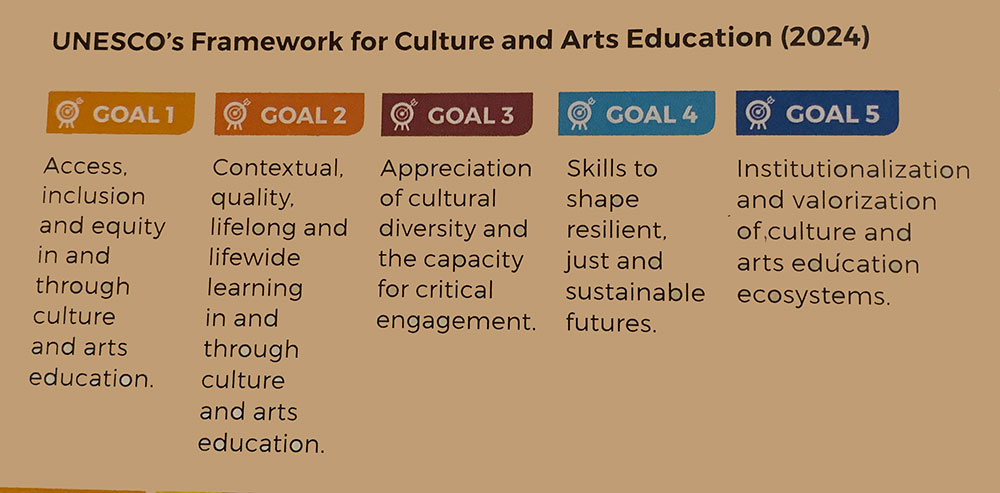
New Delhi: Recognising the transformative role of culture and arts in fostering creativity, promoting inclusive education, strengthening social cohesion, and advancing sustainable development, UNESCO New Delhi Regional Office for South Asia released its flagship report – “Rhythms of Learning – State of the Education Report for India 2024” today at the UNESCO Offices in New Delhi.
The launch witnessed high-level participation with officials from the United Nations, Ministry of Culture, diplomats, students, youth representatives and other esteemed dignitaries in attendance, reflecting the growing global and national interest in integrating culture and arts into Indian national education systems.
Speaking at the launch of the Report, Tim Curtis, Director UNESCO South Asia, said “the report is the first study of the adaptation of UNESCO’s Framework for Culture and Arts Education to a national context, providing a tailor-made approach that reflects the specific cultural and educational needs of India.”
The Indian Context
India is known as a country where arts and culture are deeply embedded across heritage, tradition and history. Over the past decades, India has increasingly focused on leveraging these rich experiences within the national, state and local education frameworks. The rollout of the National Education Policy (NEP) 2020 has ushered in a revolutionary change across arts and culture within Indian Education systems and the National Curriculum Framework (NCF) has also emphasised the critical role of culture and arts education as a pillar of holistic and inclusive learning.
In this context, the State of Education Report (SoER) 2024 by UNESCO holistically examines the landscape of culture and arts education in India. It assesses policies, their implementation, the challenges faced as well as the opportunities present to enhance arts and culture education. The report aligns its analysis with UNESCO’s framework for Culture and Arts Education, built around five key goals.

Key Findings of the Report
The Report lists out key findings on specific themes which include (1) Evolution of global perspectives on culture and arts education, (2) Role of culture and arts education in fostering creativity, equity, and lifelong learning, (3) Analysis of Indian education policies vis-à-vis UNESCO’s framework for Culture and Arts Education 2024, (4) Challenges in implementing culture and arts education in India and (5) Opportunities to promote and enhance culture and arts education across the country.
Recommendations
To address the challenges and harness the potential of culture and arts education, the report outlines 10 specific recommendations:
Recommendation 1 – Create a Culture and Arts Education Steering Committee to ensure the promotion and streamlined implementation of culture and arts education policies.
Recommendation 2 – Enhance rural-urban connectivity through culture and arts education initiatives to bridge regional disparities.
Recommendation 3 – Strengthen teaching capacity by training educators in culture and arts education pedagogy.
Recommendation 4 – Promote culture and arts education as a means for comprehensive lifelong learning.
Recommendation 5 – Employ technology to enhance accessibility and reach of culture and arts education, particularly in remote areas.
Recommendation 6 – Establish Centres of Excellence dedicated to culture and arts education to encourage innovation and best practices.
Recommendation 7 – Launch new undergraduate programs specifically designed for culture and arts education to foster academic and professional growth in the sector.
Recommendation 8 – Develop a National Culture and Arts Educational Repository to consolidate resources, research, and knowledge in this domain.
Recommendation 9 – Create an effective assessment system to ensure the quality implementation of culture and arts pedagogy across educational institutions.
Recommendation 10 – Establish a dedicated Culture and Arts Education Fund to support initiatives, programs, and infrastructure development.
The Way Forward
UNESCO’s State of Education Report (SoER) 2024 makes it clear that culture and arts education hold the power to unlock creativity, inspire innovation, and foster social unity while promoting India’s cultural heritage in the global arena. By implementing the above recommendations, India can pave the way for an inclusive, equitable, and sustainable education system.
The Report 2024 serves as a pivotal roadmap to reimagine education by integrating culture and arts. As India continues its educational transformation, embedding cultural values and artistic learning will not only shape creative thinkers of tomorrow but also nurture socially responsible citizens who carry forward India’s rich legacy on a global scale.









